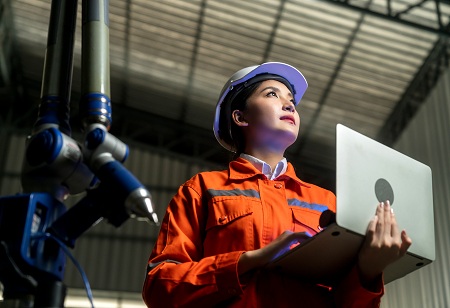
The estimated value of the global artificial intelligence in manufacturing market is USD 3.2 billion in 2023, and it is expected to grow to USD 20.8 billion by 2028, with a compound annual growth rate of 45.6% during the forecast period. The growth of the market can be attributed to the emergence of industrial IOT and automation technology.
Manufacturers can use AI technology to improve predictive maintenance and machinery inspection processes, providing them with valuable tools for the job. However, manufacturers are hesitant to adopt new technologies, particularly AI-based solutions, for their costly machinery and equipment, due to concerns about the potential for mismanagement resulting in higher costs. In addition, numerous manufacturers are uncertain about the reliability of AI-based solutions when it comes to the accuracy of maintenance and inception processes. In light of these circumstances, convincing manufacturers of the cost-effectiveness and safety of AI-based solutions can be quite a challenge. Nevertheless, manufacturers are now more open to the potential advantages of AI-based solutions and the wide range of applications they can be used for.
“Quality Inspection is another area where some organizations are successfully leveraging AI-enabled technology. Also, product yield improvements are another area where you will witness that some companies have started seeing improvements due to the machine learning algorithms that have been deployed looking at all the different parameters that contribute to the outcome of a production process.” Says Sreeji Gopinathan, Chief Information Officer (CIO), Lupin.
Automated Inspection and Defect Detection
AI plays a major role in manufacturing by automating inspection processes and detecting defects with remarkable accuracy. The conventional quality control methods frequently depend on human inspectors, which may consume a lot of time, be subjective, and susceptible to mistakes. On the contrary, artificial intelligence has the ability to analyze large volumes of data in real-time, which allows for more precise and effective detection of defects. For example :Camera-based systems utilize machine learning algorithms to examine images of car parts, detecting even the most minor flaws that could be overlooked by human inspectors. This not only enhances the overall quality of the products, but also speeds up the inspection process, resulting in higher productivity and cost savings.
“Adoption of new age technologies, such as AI, IIoT, Robotics, among others can play a key role in re-initiating business operations and start production even in adverse market conditions such as that of a pandemic.” Says Sekar Udayamurthy CO-Founder & CEO
Predictive Maintenance for Enhanced Equipment Reliability
The ability of AI to predict maintenance requirements is essential for maintaining the reliability of manufacturing equipment. AI has the capability to use historical data and real-time sensor information to anticipate potential machine failures, enabling proactive maintenance to be carried out before any critical issues arise. In addition to minimizing downtime, this also increases the longevity of the equipment, leading to overall cost savings in the long run.
For example: AI algorithms enable the plant to continuously monitor production machinery performance, identifying slight variations in vibrations, temperature, and other parameters that could signal potential problems. By anticipating machine failures, the plant can arrange for maintenance during scheduled downtimes, preventing expensive unexpected shutdowns. Taking a proactive approach not only enhances the overall effectiveness of equipment, but also guarantees a consistent and dependable manufacturing process
“According to industry reports, in the year 2020, India witnessed a remarkable surge in the Internet of Things (IoT) market, with its size estimated at approximately USD 5 billion. It is projected to grow to 9.3 billion U.S. dollars by 2025 as businesses continue to harness the power of interconnected devices and automation. The majority of IoT investments will be allocated to services, applications, cloud and software, including connectivity”, Says Manish Misra, Chief Innovation Officer, Panasonic Life Solutions India
Adaptive Process Optimization for Continuous Improvement
The use of AI allows for the gathering and examination of large volumes of data, which offers manufacturers valuable insights to support ongoing enhancements in production methods. By utilizing data analytics, manufacturers can discover patterns, trends, and opportunities for improvement, leading to improved product quality and operational efficiency.
For instance, Data Analytics in Pharmaceutical Manufacturing
AI-driven data analytics are essential in quality control in the pharmaceutical industry, where precision and consistency are of utmost importance. Data can be collected by manufacturers from different points in the production process, such as inspecting raw materials, creating formulations, and packaging the final product. The data can be analyzed by AI algorithms to discover connections between particular production factors and the overall quality of the end product. For example, manufacturers can uncover that fluctuations in temperature at a specific stage of production are linked to increased product defects through data analysis. Equipped with this understanding, they are able to enforce specific control measures to uphold ideal conditions, guaranteeing a consistently superior final product.
“The major factor that is going to drive higher adoption of industrial enzymes is the focus towards decarbonisation. World over, and including in India, there is an increased awareness on how biotechnology can play a critical role towards enabling a carbon neutral society, healthier lives and transforming the food system.”, Krishna Mohan Puvvada, Regional President and Business Director, Consumer Biosolutions, Novozymes South Asia Pvt Ltd,
The manufacturing industry is being revolutionized by the integration of AI into quality control processes. This advancement is a game-changer for the industry. AI is revolutionizing the way manufacturers approach product quality with automated inspections for improved accuracy and speed, predictive maintenance strategies to minimize downtime, and data analytics for continuous improvement. Adopting these advancements enables businesses to not only meet and surpass quality standards but also places them at the forefront of innovation in a fiercely competitive global market. As AI continues to advance, its role in quality control is sure to grow, providing manufacturers with new and advanced methods to achieve excellence in their production processes.

